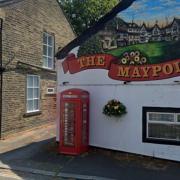Charlotte Meek and her work at The Stitch Society.

When Charlotte Meek was looking for a new challenge after recovering from cancer, she found inspiration in the weft and warp of traditional Yorkshire cloth.
She’d spent a decade carefully collecting textiles from the county’s mills with no real plan of action in mind. Then came The Stitch Society, and her pile of remnants became the fabric of her working life.
‘Sadly, many of the mills have shut down,’ she said. ‘Which makes me feel even luckier that my magpie-like collecting means I have fabric from some of Yorkshire’s great old mills that, in their hey-day, provided fine silks and wools for royalty.’
Charlotte, who now uses her textile stash to create handmade aprons and accessories, initially launched her business at home in Oxenhope but has since moved to a studio at Salts Mill, part of the renowned UNESCO World Heritage site of Saltaire.
‘Titus Salt’s entrepreneurial success and vision made this the heart of the textile industry,’ she said. ‘As someone specialising in working with beautiful cloth produced in mills just like his, it’s really fitting to make this my base.’
She reworks the fabrics she has sourced into handmade work aprons for artisans and craftspeople, which are far from run-of-the-mill and sell for between £50-80.
These are truly timeless garments with names reminiscent of early factory girls – Betty, Martha and Agnes – featuring practical pleated pockets that have proved so popular, Charlotte has patented the design.
Her work, which also includes project bags, paper patterns and children’s aprons, recently caught the attention of Selvedge, the world’s leading textile magazine which specialises in unearthing fabrics that tell a story, preserve traditions and have a strong cultural pedigree. Charlotte was invited to attend its Christmas Fair in London – the only Yorkshire business at the prestigious event aimed at the most talented designers working in the textile industry.
Magazine founder (and proud Yorkshirewoman) Polly Leonard said: ‘Vivienne Westwood told us to “Buy less. Choose well. Make it last. Quality not quantity”. This is something I try to live by, so to make my few precious clothes last longer the need for an apron has become apparent. In searching for the perfect pinny, I discovered The Stitch Society, a great brand from Yorkshire using good fabrics and simple shapes. What’s even better is that they sell their patterns so you can make your own.’
This practical frugality was imbued in Charlotte at an early age – six, in fact, when she was first introduced to the joy of crafting.
‘I was taught to sew by my grandmother,’ she said, ‘which is partly why I’m so passionate about preserving traditioned skills here in Yorkshire. The dressmaker’s dummy that once belonged to my grandmother sits right here in my studio to remind me of that every day.’
But The Stitch Society is not just a reflection of Charlotte’s own heritage – family histories from around the county are woven into the fabrics she’s collected and curated.
Take, for instance, Lynne Lilley, who donated remnants her late father had collected during his days as a weaving overlooker in Keighley and Saltaire.
‘Growing up in the 1950s and 60s, there was always good quality fabric and wool available for my mother to make new clothes,’ she explained. ‘Today, society has moved to more disposable fashion, losing its appreciation for fine quality fabrics and the sewing skills past down from generations. That’s why it’s such a delight to meet someone like Charlotte, whose fondness for fabric and our local history made me want to pass on my father’s material.’
As a result, Charlotte has named one of her latest more masculine designs after Lynne’s father, George Markham.
Paying respect to past generations is a key element of The Stitch Society’s ethos, but it’s also a forward-looking brand with bold ambitions to boost the region’s contemporary textile trade.
Overall, the UK textile industry is worth around £9 billion annually – a figure increasing year-on-year, matched by a similar rise in jobs. A recent government study, the largest of its kind for more than 20 years, identified West Yorkshire as the most condensed area for textile manufacturing in the UK. But – and it’s quite a significant but – there’s still a significant skill shortage that needs to be urgently addressed if the region is to capitalise on current and future demands.
With this at the forefront of her mind, Charlotte is now collaborating on an apprenticeship scheme with Keighley College in West Yorkshire as it launches its own Textile Academy, ensuring the skills that once put the county at the heart of the industry are not lost forever.
Chris Stott, head of business engagement at the college, said: ‘There’s huge potential to create jobs for young people in West Yorkshire as local manufacturers and retailers look to increase capacity. The academy will ensure the industry continues to thrive in the region by providing a source of talented, technically experienced workers.
‘We’re engaging with manufacturers and working closely with The Stitch Society to address the real skill-set needed in the market, developing a first-class apprenticeship scheme to match them.’
To find out more about Charlotte Meek and her work at The Stitch Society, visit thestitchsociety.com



























